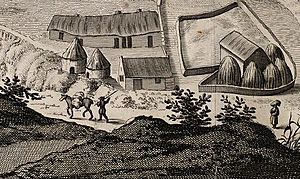Lowland Clearances facts for kids
The Lowland Clearances were a big change that happened in Lowland Scotland between about 1760 and 1830. During this time, the way people farmed the land completely changed. This led to thousands of people, known as cottars and tenant farmers, having to leave their homes and farms. They moved to new industrial cities like Glasgow and Edinburgh, or even to other countries.
What Were the Lowland Clearances?
The Lowland Clearances were a direct result of the Scottish Agricultural Revolution. This was a period when new farming methods and ideas were introduced. Before this, many families lived on small pieces of land. They often worked for a landlord and paid rent or provided services.
How Farming Changed
In the 18th century, land in Scotland started to be seen more as a business. Landowners wanted to make more money from their farms. They began renting out land through auctions, which meant the rent prices went up a lot. Many farmers could no longer afford to keep their land.
Also, new farming techniques meant that landowners needed fewer workers. Instead of many part-time workers or subtenants (like cottars), they hired a smaller number of full-time farmhands. These full-time workers often lived on the main farm or in new villages built nearby. This change meant that the traditional way of life for many cottars and small farmers began to disappear.
Life Changes for Farmers
Many small villages and farm settlements were taken down. The people living there had to find new places to go. Some landowners built new villages on the edges of their large farms. These new villages were meant to house the people who had been displaced.
However, many others had to move to the growing industrial cities. Places like Glasgow, Edinburgh, and even northern England offered new jobs in factories and industries. Some people also chose to emigrate, meaning they moved to other countries. Canada was a popular choice, as it offered new opportunities to own and farm land. While many moved, some people chose to stay in Scotland, either because they wanted to or because they couldn't afford to travel far away.


